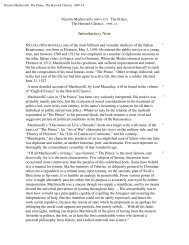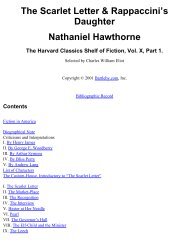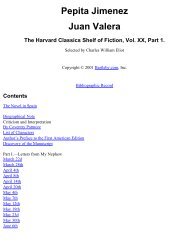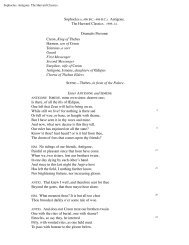- Page 1 and 2:
Contents Notre Dame de Paris Victor
- Page 3 and 4:
VI. Three Various Hearts of Men Boo
- Page 5 and 6:
chapters of “Les Travailleurs de
- Page 7 and 8:
genius, compels our acceptance of t
- Page 9 and 10:
These chapters, however, are the na
- Page 11 and 12:
showy superficiality of thought, an
- Page 13 and 14:
Book I I. The Great Hall PRECISELY
- Page 15 and 16:
and he will have some idea of the s
- Page 17 and 18:
Nothing was to be heard but grumbli
- Page 19 and 20:
“We’ll make a bonfire to-night
- Page 21 and 22:
“She pays her fourpence—quatuor
- Page 23 and 24:
II. Pierre Gringoire UNFORTUNATELY,
- Page 25 and 26:
“He has a splendid beard,” said
- Page 27 and 28:
therein they chose the better part.
- Page 29 and 30:
fact. However, tranquillity had gra
- Page 31 and 32:
and white; meaning that in that yea
- Page 33 and 34:
evolutionary times, would have appe
- Page 35 and 36:
“Monsieur the Provost of the Pala
- Page 37 and 38:
The Provost advanced to the front o
- Page 39 and 40:
empty ring of stone, through which
- Page 41 and 42:
“Sir,” returned the big man wit
- Page 43 and 44:
“Croix-Dieu!” cried the hosier,
- Page 45 and 46:
that nobody’s using,’ and away
- Page 47 and 48:
II. The Place de Grève THERE remai
- Page 49 and 50:
of her hair, her gleaming eyes, she
- Page 51 and 52:
sachette 23 scolding again. Has she
- Page 53 and 54:
mention flutes and brasses. Alas, o
- Page 55 and 56:
And he filled in the asterisks whic
- Page 57 and 58:
“Thank you,” she replied; and w
- Page 59 and 60:
Accordingly, he began to retrace hi
- Page 61 and 62:
face of Paris; a drain whence flowe
- Page 63 and 64:
almost lost in a great iron pot, wh
- Page 65 and 66:
the heterogeneous mass; in the firs
- Page 67 and 68:
your left foot.” “Monseigneur,
- Page 69 and 70:
one of you, from the witch to her c
- Page 71 and 72:
You have been young, reader—maybe
- Page 73 and 74:
She seemed not to hear him. He trie
- Page 75 and 76:
She drew from her bosom a little ob
- Page 77 and 78:
meaning ‘the sun.’” “The su
- Page 79 and 80:
pointed ones of the chancel and bac
- Page 81 and 82:
Flamel paved the way for Luther—p
- Page 83 and 84:
circumvallation, and immures Paris
- Page 85 and 86:
the University, Rue de la Juiverie
- Page 87 and 88:
The University itself appeared as o
- Page 89 and 90:
he came to visit Paris, and the lio
- Page 91 and 92:
element to the view: that of a long
- Page 93 and 94:
edifices in the grand style; the Pl
- Page 95 and 96:
listening to. In general, the murmu
- Page 97 and 98: thus at his side his two monitors
- Page 99 and 100: four faculties. Life for this young
- Page 101 and 102: Quasimodo then was bell-ringer of N
- Page 103 and 104: solitary converse with it. If any o
- Page 105 and 106: The case was simple enough. Claude
- Page 107 and 108: So, at least, it was supposed, whet
- Page 109 and 110: It was, moreover, noticed that, for
- Page 111 and 112: “Well, well, Maitre Claude, all t
- Page 113 and 114: “There are certain matters about
- Page 115 and 116: clear. I cannot read—I am but con
- Page 117 and 118: To our mind, this thought has two a
- Page 119 and 120: architecture, sister of the theocra
- Page 121 and 122: into the divine symbols in which th
- Page 123 and 124: If, instead of the characteristic m
- Page 125 and 126: Book VI I. An Impartial Glance at t
- Page 127 and 128: the Provost, an office he performed
- Page 129 and 130: Quasimodo made no answer to this qu
- Page 131 and 132: it in his turn, felt some qualms of
- Page 133 and 134: penitents were not to the fore, lep
- Page 135 and 136: “But their horses are a treat to
- Page 137 and 138: la Pucelle—the Maid of Orleans—
- Page 139 and 140: and vagabonds—wandering about the
- Page 141 and 142: “And was it never known what beca
- Page 143 and 144: The cell was small, wider than it w
- Page 145 and 146: The shock had awakened the recluse
- Page 147: attractions of that at the Halles.
- Page 151 and 152: moment—with his purple, streaming
- Page 153 and 154: Book VII I. Showing the Danger of C
- Page 155 and 156: working at?” “Fair cousin,” a
- Page 157 and 158: efore him since the beginning of th
- Page 159 and 160: The Egyptian advanced towards the n
- Page 161 and 162: The gipsy girl crouched on her knee
- Page 163 and 164: etreat and was preparing to insert
- Page 165 and 166: “I admit, master, that it is bett
- Page 167 and 168: desired trick. It had been trained
- Page 169 and 170: old loves. But when he had set them
- Page 171 and 172: iron sheeting. Any one curious to i
- Page 173 and 174: unning stream, as a ray of sunshine
- Page 175 and 176: charge.” “Pah! a shabby Montaig
- Page 177 and 178: “I have lost my note-books.”
- Page 179 and 180: V. The Two Men in Black THE PERSON
- Page 181 and 182: Pierrat—Maître Jacques, I should
- Page 183 and 184: “Oh, most excellent and honourabl
- Page 185 and 186: As they turned a corner, the sound
- Page 187 and 188: “By the warts of my grandmother!
- Page 189 and 190: At this name the spectre’s grip t
- Page 191 and 192: door closed behind him; he heard Ph
- Page 193 and 194: you at your full height, and hear t
- Page 195 and 196: girl, who had sat pale and dreamy,
- Page 197 and 198: holes, it is not from the weight of
- Page 199 and 200:
groundfloor window and the window o
- Page 201 and 202:
specification of the expenses of th
- Page 203 and 204:
view a confused mass of horrible ob
- Page 205 and 206:
have no written equivalent in any h
- Page 207 and 208:
This incident—this final proof—
- Page 209 and 210:
Since she had been here she neither
- Page 211 and 212:
itself over her memory was rent asi
- Page 213 and 214:
The priest looked the prisoner in t
- Page 215 and 216:
emperor, an archangel—God—that
- Page 217 and 218:
But if the child be lost, these tho
- Page 219 and 220:
has long been hungry and feels that
- Page 221 and 222:
“And where, if you please? and wh
- Page 223 and 224:
“No, no!” cried the girl; “on
- Page 225 and 226:
“Then stay,” she returned imper
- Page 227 and 228:
Fleur-de-Lys. He staggered, passed
- Page 229 and 230:
hands like a white drapery; but he
- Page 231 and 232:
Again, when he sought to picture to
- Page 233 and 234:
his back that he might not see, and
- Page 235 and 236:
snorting and stamping, with its pil
- Page 237 and 238:
eside the tomb of Saint-Denis, the
- Page 239 and 240:
There was something more plaintive
- Page 241 and 242:
firmly seated than when it has no s
- Page 243 and 244:
“Damnation!” he muttered, as he
- Page 245 and 246:
“Horns of the devil!” growled P
- Page 247 and 248:
was of glass, very beautiful in sha
- Page 249 and 250:
She tried to scream but could not.
- Page 251 and 252:
and visit her there. He sometimes t
- Page 253 and 254:
the end of the street, their lances
- Page 255 and 256:
“How is she to be saved?” repea
- Page 257 and 258:
“When all’s said and done,” p
- Page 259 and 260:
“The end?” said the Archdeacon.
- Page 261 and 262:
eer-cans on their heads, the player
- Page 263 and 264:
“My charmer, ’tis moonlight; lo
- Page 265 and 266:
All at once, while he was reconnoit
- Page 267 and 268:
Dame—were fortified. The Abbey of
- Page 269 and 270:
The King of Tunis ran boldly to the
- Page 271 and 272:
to be the first, when it should ope
- Page 273 and 274:
The King of Tunis frowned gloomily.
- Page 275 and 276:
nickname. Henceforth they shall cal
- Page 277 and 278:
yellow damask with no decoration of
- Page 279 and 280:
He smiled in the consciousness of h
- Page 281 and 282:
here, the dead was alive. The King
- Page 283 and 284:
“Pardieu! yes, Sire!” answered
- Page 285 and 286:
“And what is their grievance agai
- Page 287 and 288:
“What is thy name?” “Gieffroy
- Page 289 and 290:
that I am greatly frightened at the
- Page 291 and 292:
Jacques Coictier made a profound ob
- Page 293 and 294:
Burgundy was a great seigneur, and
- Page 295 and 296:
Rejuvenated by passion, he began to
- Page 297 and 298:
“Quick, then, let us be going!”
- Page 299 and 300:
storm, of what was in progress, wha
- Page 301 and 302:
“Upon my soul!” suddenly exclai
- Page 303 and 304:
Suddenly she felt the hand of the u
- Page 305 and 306:
and shaken by sobs, he made a more
- Page 307 and 308:
e hanged!” She turned her fading
- Page 309 and 310:
against them with such force that o
- Page 311 and 312:
lack hair round her to cover the wh
- Page 313 and 314:
consciousness that she was not sayi
- Page 315 and 316:
the window, her two hands spread on
- Page 317 and 318:
eyes fixed, listening to the poor c
- Page 319 and 320:
The girl saw the soldiers advancing
- Page 321 and 322:
He called to mind a thousand variou
- Page 323 and 324:
from the end of the rope, some feet
- Page 325 and 326:
It was for this reason the Archdeac
- Page 327 and 328:
The date September 1 is put in at t
- Page 329 and 330:
[back] Note 26. A primitive stringe
- Page 331 and 332:
and has the small benefice which Sa
- Page 333:
York: P.F. Collier & Son, 1917; Bar










